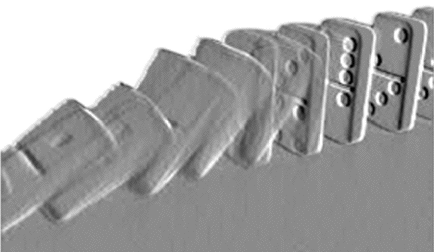INSTITUTE CARGO CLAUSES CAUSATION
The revised Institute Cargo Clauses have retained a number of different phrases for expressing the fundamental connection between the risk and the loss. These causation triggers include “caused by”, “arising from”, “resulting from”, “attributable to” and “reasonably attributable to”.
In addition, the exclusion of loss damage or expense resulting from nuclear incidents in Clause 4.7 of the (A) Clauses uses two causation triggers: “directly or indirectly caused by” and “arising from”.
These variations are now examined starting with “caused by” as representing the customary proximate cause rule, and then looking at the other phrases used to establish the extent to which that rule may be varied case by case.
The phrase “proximately caused by” which was used in the 1982 Clauses in exclusion 4.5 in relation to delay is no longer used in the revised Institute Cargo Clauses.
Different provisions as to causation may apply to the risks insured or the exclusions, or to both. In the Institute Cargo Clauses (A) the causation triggers are only used in relation to the exclusions the positive cover for all risks is simply expressed in Clause 1. with the phrase: “This insurance covers all risks of loss of or damage to the subject-matter insured”. In the absence of any particular causation provision, section 55(1) of the Marine Insurance Act 1906 provides that, “the insurer is liable for any loss proximately caused by a peril insured against” and the ordinary proximate cause rule applies. By contrast, the Institute Cargo Clauses (B) and (C) use the phrase “reasonably attributable to” in relation to the first group of perils insured, fire or explosion etc, and the words “caused by” in respect of the balance of the perils, general average, jettison etc. This introduces different causation rules in relation to the perils themselves while, in relation to the (A) Clauses, the causal variations are confined to the exclusions.
“caused by”
The term “caused by” is used to introduce the second group of perils in the (B) and (C) Clauses and in relation to the exclusions of insufficiency of packing (Clause 4.3); inherent vice (Clause 4.4); delay (Clause 4.5); insolvency and financial default (Clause 4.6); as well as in the war and related exclusions (Clause 6) and the exclusions relating to strikers and terrorism (Clause 7.1). As we shall examine next, the notable exception being in relation to strikes” where the trigger is loss damage or expense “resulting from” strikes.
“resulting from”
The term “resulting from” is used in exclusion 7.2, which needs to be considered in contrast with the words «caused by» used in Clause 7.1?
“In no case shall this insurance cover loss damage or expense caused by strikers, locked-out workmen, or persons taking part in labour disturbances, riots or civil commotions resulting from strikes, lock-outs, labour disturbances, riots or civil commotions…”
The usual practice is to take out separate insurance against strikers under the Institute Strikes Clauses (Cargo) which provide as follows:
“This insurance covers. . .
1.1 strikers, locked-out workmen, or persons taking part in labor disturbances, riots or civil commotions…”
The Strikes Clauses further provide:
“In no case shall this insurance cover 3.7 loss damage or expense arising from the absence shortage or withholding of labour of any description whatsoever resulting from any strike, lockout, labour disturbance, riot or civil commotion.”
It will be seen that there is positive cover under Clause 1.1 of the Strikes Clauses for loss of or damage to the cargo done by strikers but not for losses or, more particularly, expenses resulting from a strike. Thus the intention is that there is cover for damage done by strikers, as where they burn down a warehouse and destroy the cargo stored there, but there is no cover under the Strikes Clauses for losses or expense “resulting from” strikes where a strike leads to deterioration in the cargo by reason of a failure in support services (e.g., electricity to service refrigeration machinery storing chilled or frozen cargo). Delays resulting from strikes would also be excluded under this Clause 7.2 in parallel with the delay exclusion under Clause 4.5.
It is assumed that the words ‘resulting from” are intended to widen the proximate cause rule to encompass more remote causes. However, the effectiveness of the words “resulting from” to achieve this is doubtful as these words have been treated by the courts as triggering the ordinary proximate cause rule. In particular, the expression “result from” undoubtedly imparts the notion of causation which, in turn, in all branches of insurance law, involves application of the notion of proximate cause, applied with good sense, so as to give effect to and not to defeat the intention of the parties.
Similarly, in general, words such as “resulting from” in an exception clause are to be treated as excluding only those losses proximately caused by the events mentioned. However, in relation to the strikes exclusion clause, by reason of the contrast between the words “resulting from” in Clause 7.2 and the words “caused by” in Clause 7.1, it is doubtful that “a broader test than proximate cause is to be applied under Clause 7.2”. Moreover, the words “resulting from” may be perceived by the insurance market as excluding more remote causes.
The market perception and the suggestion that “a broader test than proximate cause is to be applied” raise the difficulty of what test that would be. The purpose may be to exclude deterioration and delay following from a strike due to withdrawal of labour. This risk operates rather indirectly in the same way as delay. The loss to the cargo, or the expense incurred to avoid loss, is a consequence of some other more immediate risk, for example bacteriological deterioration, as where electricity supplies have been interrupted by a strike. It may be tentatively suggested that “resulting from” may be treated as opening the door to the operation of two concurrent risks, characteristically delay caused by a strike or withholding of labour, and some form of deterioration to the cargo. If this is right, the words “resulting from” serve to make it clearer that the exclusion applies even if the immediate cause of the loss is deterioration and the somewhat less immediate but nevertheless simultaneous cause is a strike.
“arising from”
The words “arising from” appear in the revised Institute Cargo Clauses in the Nuclear Accidents Exclusion (Clause 4.7 of the (A) Clauses and Clause 4.8 of the (B) and (C) Clauses) in the phrase “directly or indirectly caused by or arising from”. As the words “directly or indirectly caused by”1.1.2 encompass more remote causes they go well beyond the term “arising from” in widening the chain of causation and this renders the words “arising from” redundant in this Clause. The words “arising from” may be surplus but were retained in the Nuclear Accidents Exclusion as a matter of caution and to be consistent with Clause CL 370 (Radioactive Contamination etc.) which is a generally used exclusion of nuclear accidents and a wider group of risks with the capacity to cause catastrophic losses.
The second place the phrase “arising from” is used is in the unseaworthiness exclusion (Clause 5.1) which opens with the words:
“In no case shall this insurance cover loss damage or expense arising from unseaworthiness of vessel or craft. . . unfitness of container or conveyance …”
“Although this exception insolvency of shipowners etc in Clause 4.6, in contrast to earlier exceptions in Clause 4, uses the expression “arising from” we doubt that any different test for causation was intended to be applicable.”
“Words such as ‘due to’, ‘resulting from’, or ‘arising from’ in an exceptions clause in a policy have been construed as excluding only those losses proximately caused by the events mentioned.”
In Marine Insurance, in the context of the insolvency exclusion, is also of the view that “arising from” is no different from “caused by” as both require proximate cause, saying:
“It is necessary for underwriters (on whom the onus lies) to show that the loss damage or expense was proximately caused by (‘arising from’) the insolvency or financial default. In many instances, the chain of causation would be difficult to establish.”
However, “The substitution of the words ’caused by’ in place of ‘arising from’ suggests that underwriters have conceded a drafting error in the original text.”
The comment most probably reflects the market perception that the words “arising from” are intended to broaden the concept of causation. It is unclear whether this is the legal position. The words “arising out of”, as used in the phrase “arising out of one event”, were held to imply a wider test of causation, where the words were “series of losses arising from one event” gives a similar view that these words implied a wider test of causation.
The words “caused by” and “arising from” had always been construed as relating to the proximate cause. It seems, therefore, that the market perception that “arising from” implies a wider test of causation is probably not in accord with the legal position that treats “arising from” as triggering the ordinary proximate cause rule.
Nevertheless, assuming the market perception to be correct, how does this bear on the revised Institute Cargo Clauses, and the continuing use of the words “arising from” in the unseaworthiness exclusion?
Does the loss of cargo or, more commonly in practice, the cost of forwarding, have to be proximately caused by the unseaworthiness or could unseaworthiness is a more remote cause? If “arising from” encompasses a more remote cause, what is the test? It is difficult, if not impossible, to assess degrees of remoteness, except where the test is “directly or indirectly caused by”, and the solution may lie in construing the words “arising from” to allow the operation of one of two concurrent causes. It is to be noted that, in the same context of unseaworthiness, section 39(5) of the 1906 Act uses the phrase any loss “attributable to” unseaworthiness that this would apply where unseaworthiness was “a” cause of the loss. A similar approach should, perhaps, be adapted to the words “arising from” in the unseaworthiness exclusion in Clause 5 of the Institute Cargo Clauses. If “arising from” means proximately “caused by”, which is more in harmony with the legal authorities, the result is more hesitant, but may be the same as the modern approach to proximate cause allows for a finding of two causes both of which are “proximate”.
The words “attributable to” are used in Exclusion 4.1 of the Revised Institute Cargo Clauses which reads:
“In no case shall this insurance cover loss damage or expense attributable to wilful misconduct of the Assured.”
This reflects the words of the Marine Insurance Act 1906 section 55 which, so far as material, are as follows:
“55(l)(a) The insurer is not liable for any loss attributable to the wilful misconduct of the assured.
The effect of the words “attributable to” is discussed as follows:
“It seems, however, to be clear in principle that wilful misconduct of the assured is a defence not only when it is the proximate cause of loss but also when it is only one of the effective causes of, or factors contributing to a loss. A similar rule appears also to obtain in cases, of the type provided for in section 39(5) of the Marine Insurance Act 1906, where the ship is sent to sea in an unseaworthy state, with the privity of the assured.”
On this basis the words “attributable to” are significantly wider than “caused by”. They are more appropriate because any wilful misconduct of the assured that bears on the loss should invalidate the claim.
The importance of the principle that the proximate cause rule does not apply to wilful misconduct would not seem to lie only in the degree of remoteness but also in the fact that the words “attributable to” open up the possibility of the loss being excluded even where wilful misconduct is only a cause of the loss. This was more important where only the closest cause was considered so that a loss by scuttling was a loss by perils of the sea and the more remote cause, dishonesty, was disregarded. However, the rule serves a useful purpose today in highlighting the fact that a loss caused to any appreciable extent by the assured’s dishonesty is tainted and will not be recoverable under a cargo insurance cover even if the dishonesty is only a subsidiary concurrent cause of the loss.
“reasonably attributable to”
The words “reasonably attributable to” introduce the first set of risks (Clause 1.1) in the Institute Cargo Clauses (B) and (C). Do these words “otherwise provide” so as to displace the proximate cause rule in section 55(1) of the Marine Insurance Act 1906? whether the policy “otherwise provides” is simply a matter of structure. On that basis the words “reasonably attributable to” in Clause 1.1 are to be contrasted to the words “caused by” in Clause 1.2, and it seems to follow that the formula “reasonably attributable to” is intended by the draftsmen to be different and that, accordingly, this is a case where the policy does otherwise provide so that the proximate cause rule is not applicable.
“The test for causation under the words ‘reasonably attributable to’ may be less stringent than the proximate cause test. In principle, it appears that reasonable evidence of a causal link between the specified peril and the loss claimed is sufficient under this part of the clause.”
The point being addressed was whether the phrase “may have been attributable to” encompassed a remote cause, a scheme formulated prior to the voyage to scuttle the ship with her cargo, was not concerned with the question of whether the words “reasonably attributable to” were wide enough to encompass one of the causes where two or more causes were immediately operating and each contributed to, or brought about, the loss.
If “reasonably” adds little then we are again concerned with the phrase “attributable to”. As discussed, these words cover a situation where “a” cause is sufficient even though it may operate in conjunction with other causes and not be the only effective cause of the loss. This would seem to be the intention in relation to the first group of risks (Clause 1.1) enumerated in the (B) and (C) Clauses.
“directly or indirectly caused by”
The nuclear accidents exclusion in the Institute Cargo clauses (Clause 4.7) provides as follows:
“In no case shall this insurance cover loss damage or expense directly or indirectly caused by or arising from the use of any weapon or device employing atomic or nuclear fission and/or fusion or other like reaction or radioactive force or matter.”
The words “directly or indirectly caused by” are the widest causation trigger used in the Institute Cargo Clauses.
The words “directly or indirectly” are used cautiously in the Institute Cargo Clauses as there is force in the appreciation that it is extremely difficult to determine how remote the cause must be. However, there is some regulation in the cases. It seems that “a more remote link in the series of causation is contemplated”, but there must be a connection and that the connecting point lies where “an event ceases to be a cause of the loss, and becomes merely an item of history”. The reasonable concerns of insurers regarding nuclear accidents and other catastrophic events certainly explain and may also justify the use of the exceptional causation trigger “indirectly” in relation to what are seen as risks that may exceed the capacity of the insurance markets.
Summary of the effect of the causation triggers
The effect of the various causation provisions used in the Institute Cargo Clauses may be summarized as follows, starting with “caused by” which triggers the ordinary proximate cause rule, and finishing with “indirectly caused by”, which is the widest term used and encompasses more remote causes.
“Caused by” means proximately caused by. This is the normal rule in insurance law. This looks to identify the predominant cause or causes on a broad common sense view of the whole position.
“Resulting from” generally means the same as “caused by”. However, in Clause 7.2 of the Institute Cargo Clauses, the words “resulting from strikes”, used in coincidence to “caused by strikers” in Clause 7.1 may be intended to enlarge the strikes exclusion.
“Arising from” is generally taken by the courts to mean the same as “caused by”, market perception, however, is probably that the term encompasses a more remote cause or causes. The effect on the unseaworthiness exclusion in Clause 5 of the Institute Cargo Clauses may not be significantly different as on either view if a cause of the loss is unseaworthiness then that loss is excluded by reason of the rule that where two causes are concurrent, the express exclusion prevails over the cover.
“Attributable to” is wider than proximately caused by and covers the case where the risk is “a” cause of the loss even where it is only one of the effective causes or factors contributing to the loss.
“Reasonably attributable to” means the same as attributable to as the word “reasonably” appears to add little or nothing to this phrase.
“Indirectly caused by” extends well beyond proximately caused by but there must still be a connection between the loss and the risks involved which must not be a mere matter of background or history, albeit a more remote link in the chain of causation is contemplated.
Takis Kalogerakos
Marine Underwriter





